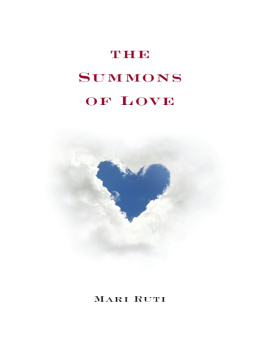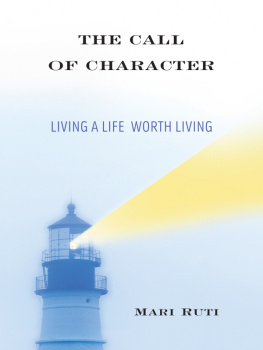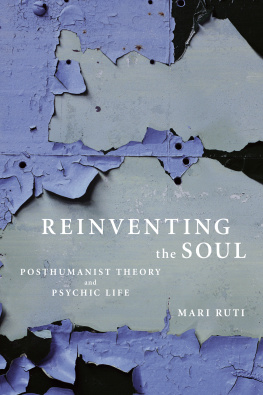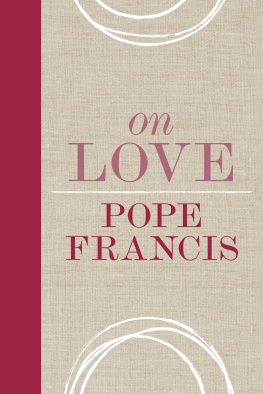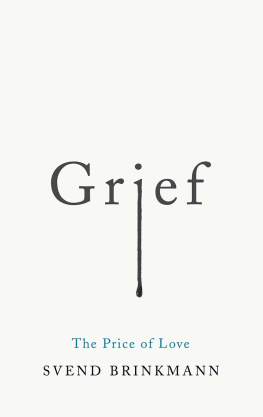THE
S UMMONS
OF L OVE
THE
S UMMONS
OF L OVE
M ARI R UTI
Columbia University Press New York
Columbia University Press
Publishers Since 1893
New York Chichester, West Sussex
cup.columbia.edu
Copyright 2011 Columbia University Press
All rights reserved
E-ISBN 978-0-231-52798-9
Library of Congress Cataloging-in-Publication Data
Ruti, Mari.
The summons of love / Mari Ruti
p. cm.
ISBN 978-0-231-15816-9 (cloth : alk. paper)ISBN 978-0-231-52798-9 (ebook)
1. Love. 2. Responsibility. I. Title.
BF575.L8R8787 2011
177.7dc22 2010050833
A Columbia University Press E-book. CUP would be pleased to hear about your reading experience with this e-book at .
References to Internet Web sites (URLs) were accurate at the time of writing. Neither the author nor Columbia University Press is responsible for URLs that may have expired or changed since the manuscript was prepared.
Honey, now if Im honest, I still dont know what love is.
David Gray, The Other Side
Contents
Romantic love summons us to become more interesting versions of ourselves. It speaks to those dimensions of our being that reach for enchantmentthat chafe against the mundane edges of everyday existence. If much of life entails a gradual process of coming to terms with the limitations imposed on us by our mortality (by the tragically fleeting character of human experience), love boldly pursues the immortal. This does not mean that it grants us everlasting life. It cannot, unfortunately, rescue us from the relentless march of the clock. But to the extent that it rebels against the undertow of everything that is trite or prosaic about the world, it touches the transcendent; it ensures that we do not completely lose contact with the loftier layers of life.
Our mortal bodies are always filled with immortal longings in the sense that what we yearn for psychologically and emotionally is often much more ardent than what our human frames can sustain. It is as if our frail bodies were inhabited by the heaving breath of a restless giant. This giant clamors for freedom and recognition. It strives to break the shackles that bind it to the narrow confines of material existence. Yet we have no way of keeping it alive outside of our mortal bodies. The best we can do is to find various ways to feed it within the boundaries of our daily experience; we have no choice but to learn to live with, and even welcome, the excess inner agitation that, time and again, disturbs our plans for calm and unruffled lives.
It would be easy to interpret the fact that our immortal longings do not fit comfortably within our mortal bodies as a curse or a cruel existential joke. Yet the tension between what we are and what we yearn to become is what lends human life much of its innovative energy. Because this tension keeps us from feeling fully satisfied with our lives, it compels us to reinvent ourselves on a regular basis. It repeatedly pushes us into cycles of personal renewal that guarantee that we do not become emotionally stagnant or complacent; it prevents us from becoming bored with ourselves by supplying us with an endless array of new aims, aspirations, and preoccupations. It is, in short, the underpinning of everything that is creative about our lives. And, during our most inspired moments, it connects us to the more sublime frequencies of human experience.
Traditionally, the sublime has been envisioned as what inspires awe while resisting our ability to fully fathom its scope or power. The most common examples of the sublimestormy oceans, rugged mountains, immeasurable deserts, starry skies, the darkness of night, absolute solitude, or some misfortune of soul-shattering magnitudepossess an enormity, force, or mysterious depth that escapes human control. We can neither tame them nor capture them within the folds of our imagination. Yet the very fact that we feel inadequate in the face of the sublime induces us to stretch our minds so that we can at least draw closer to what eludes us; it invites us to activate a greater range of our conceptual capacities so that we come to fill up more of the space between ourselves and what we cannot attain. This is why the sublime stirs us: it speaks the language of the immortal giant within us.
The same can be said of love. Love ruptures the canvas of our everyday experience so that we feel transported beyond the ordinary parameters of our lives. The French critic Julia Kristeva conveys this perfectly when she states that love gives us the impression of speaking at last, for the first time, for real. It allows us to feel fully and exuberantly alive, as if we were finally saying something enormously significant. If the normal organization of our lives tends to be a bit monotonous, love represents a sudden fissurean unexpected break, swerve, or deviationin that organization. This is why we often experience it as a stunning revelation that allows us to view the world from an unsullied perspective. It is as if everything that is dazzling, radiant, hopeful, and untarnished about the world slid into view from behind the familiar screen of our everyday reality. We feel oddly rejuvenated, connected to the deepest recesses of our being. Our daily routine becomes animated so that even its most humdrum facets seem heavy with potential. In this way, falling in love accelerates our personal process of evolution.
As human beings, we are all engaged in this ongoing process. On the one hand, most of us have a strong sense of what gives consistency to our identitiesof what makes us usthrough the passage of time; we are aware of a kernel of personality that gathers our disparate experiences into a semicoherent perception of self. On the other hand, who we are today is never entirely the same as who we were yesterday. And tomorrow will bring yet another edition of us into being. Much of the time we evolve at such a snails pace that we are unaware of the changes we undergo. However, there are times when we are all of a sudden thrust onto a new pathwhen some unanticipated event or chance encounter alters the entire direction of our lives. Such episodes can be painful or troublesome, for often we are forced onto an unfamiliar route out of necessity, perhaps because the old one has become so riddled with obstacles that it is no longer passable. In such cases, we may be fearful of the nameless monsters lurking around the bend and, therefore, less than keen to proceed. But existential nudges that seem to come out of nowhere and that alter our lives beyond recognition can also feel miraculous, conjuring up a whole new universe of enticing possibilities. Being struck by Cupids arrow is among the most coveted of such nudges.
The wager of this book is that when we are summoned by love, we are brought to the threshold of an enormous opportunity. Choosing to cross this threshold sends tremors through the sum total of our existence so that, once we have stepped to the far side, there is no turning back. Regardless of how things work out in the end, our lives have been utterly and irrevocably modified. We cannot go on living as usual but must, instead, devise fresh modalities of making our way through the world. This is because whenever we accept loves invitation, we also extend one: we open the door to another person so that he or she can, metaphorically speaking, set up camp within our interiority. The consequences of this are far more radical than we might at first realize, for there is no way to receive a lover into our private domain without renegotiating the basic outlines of our being.

